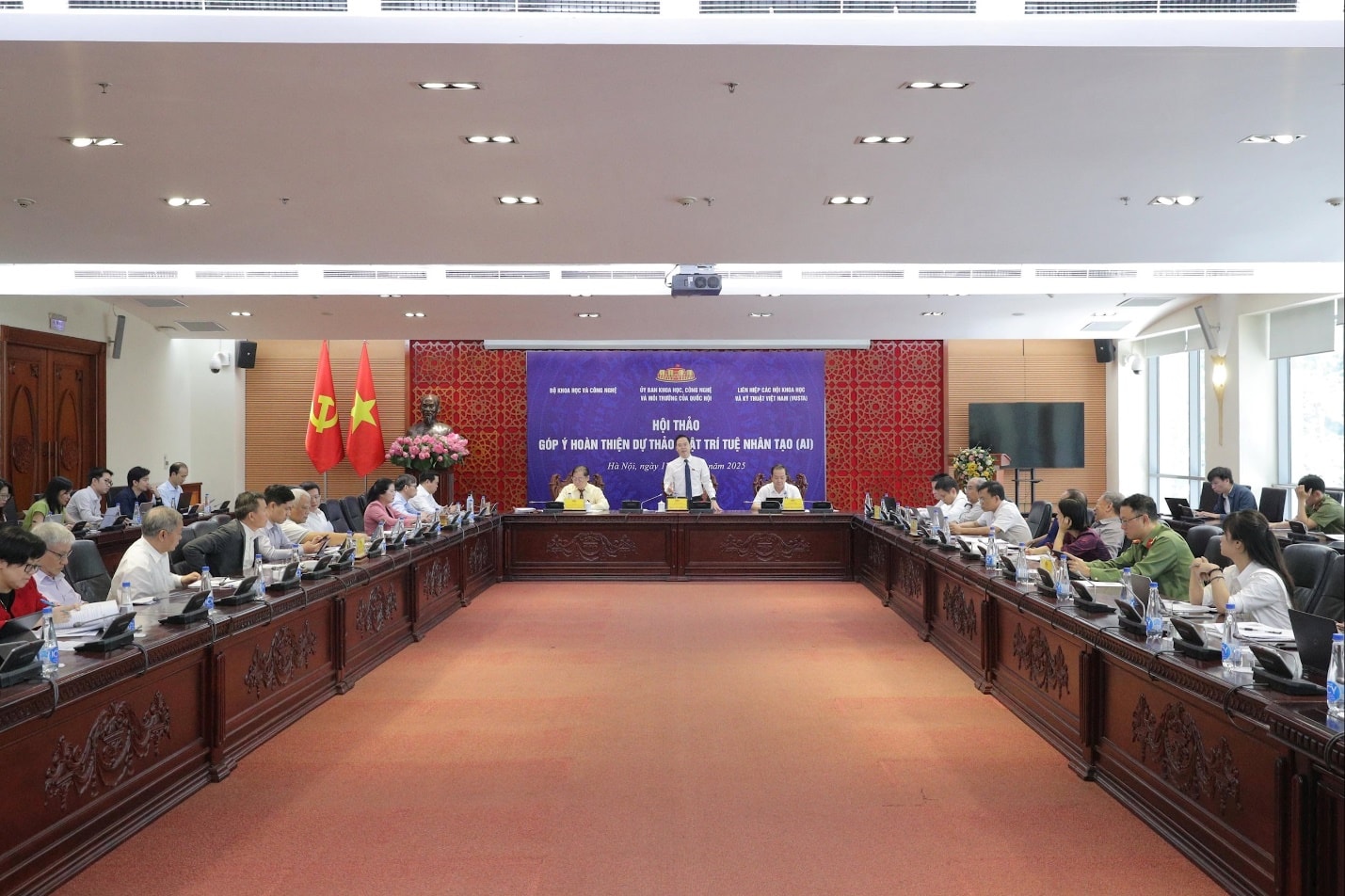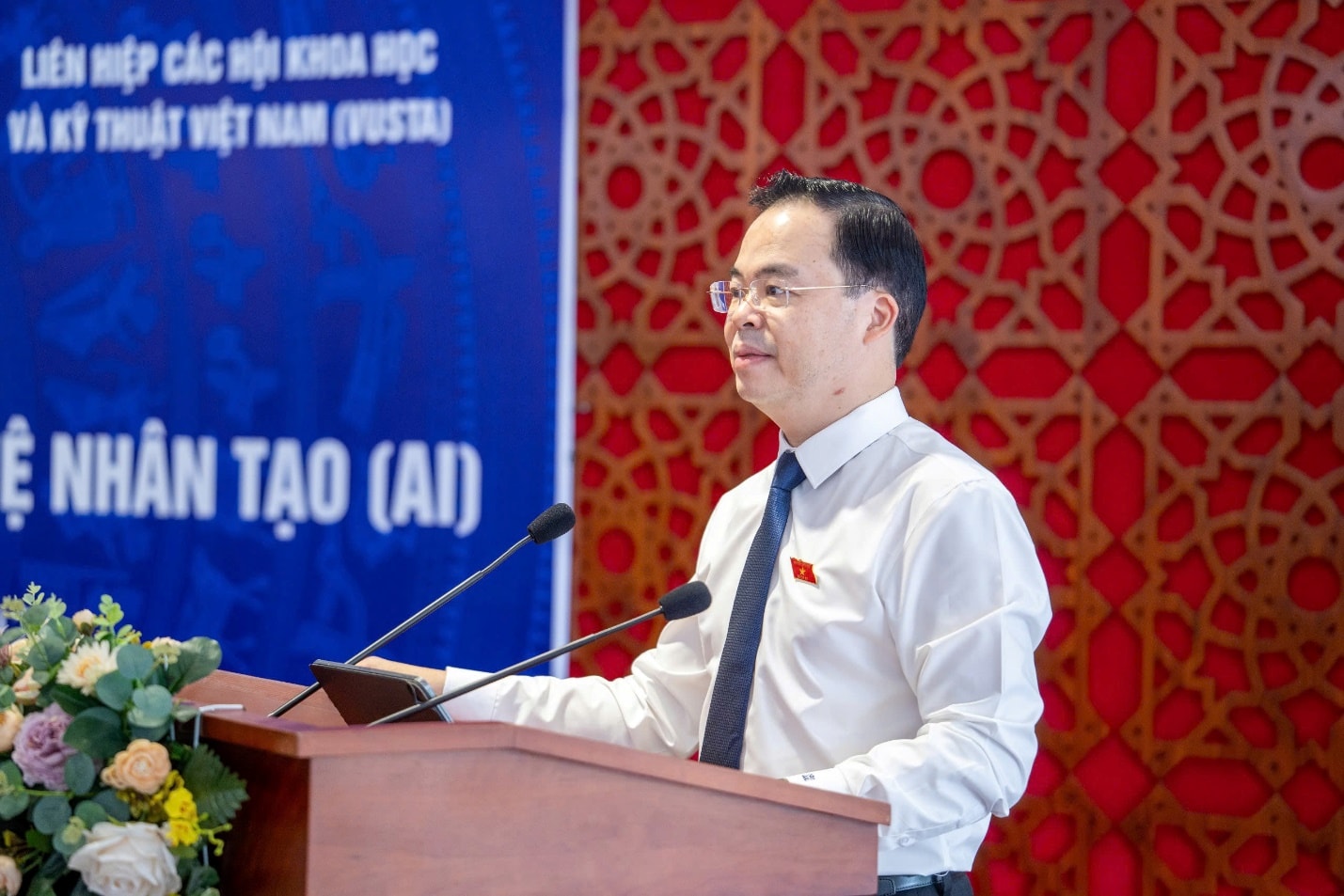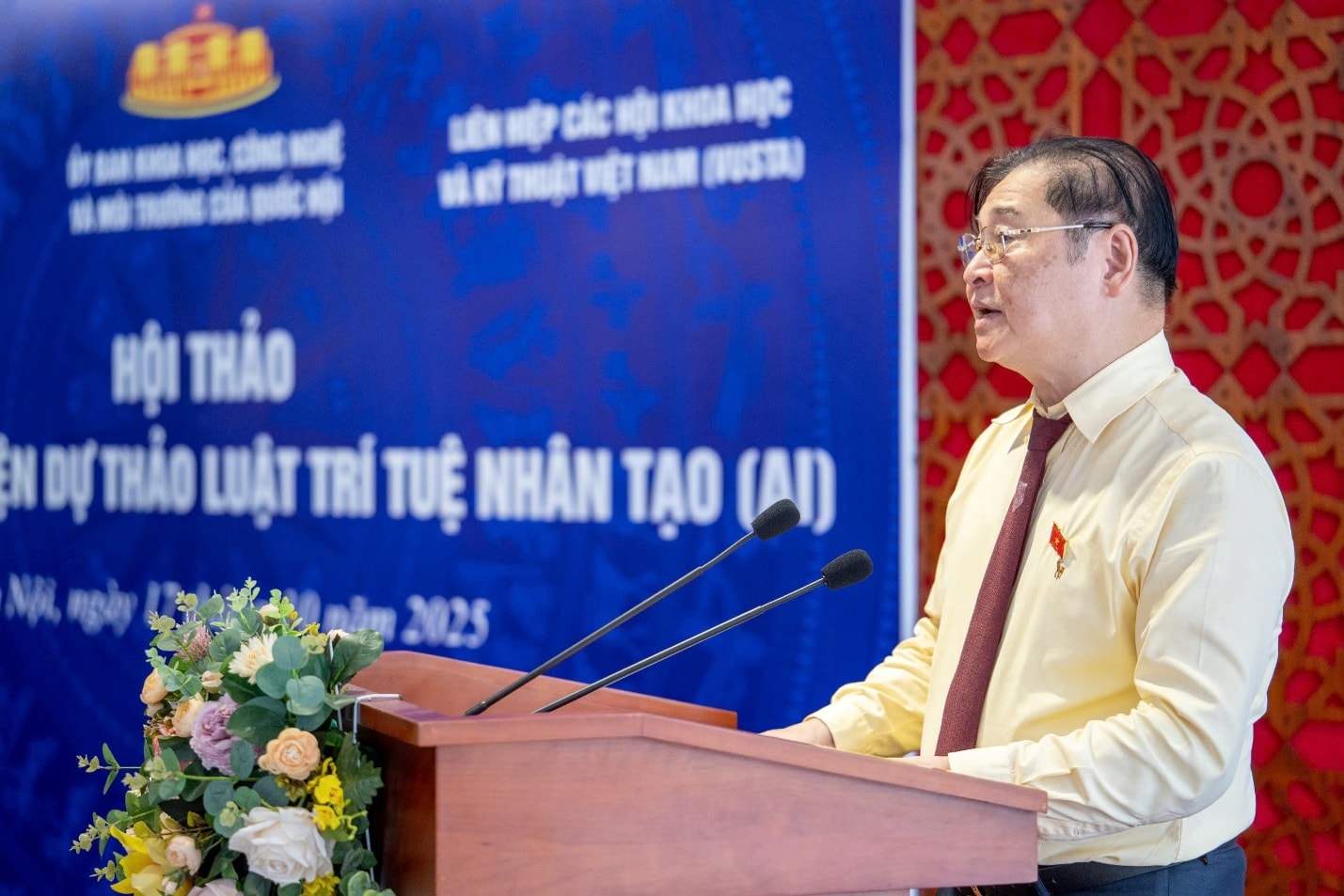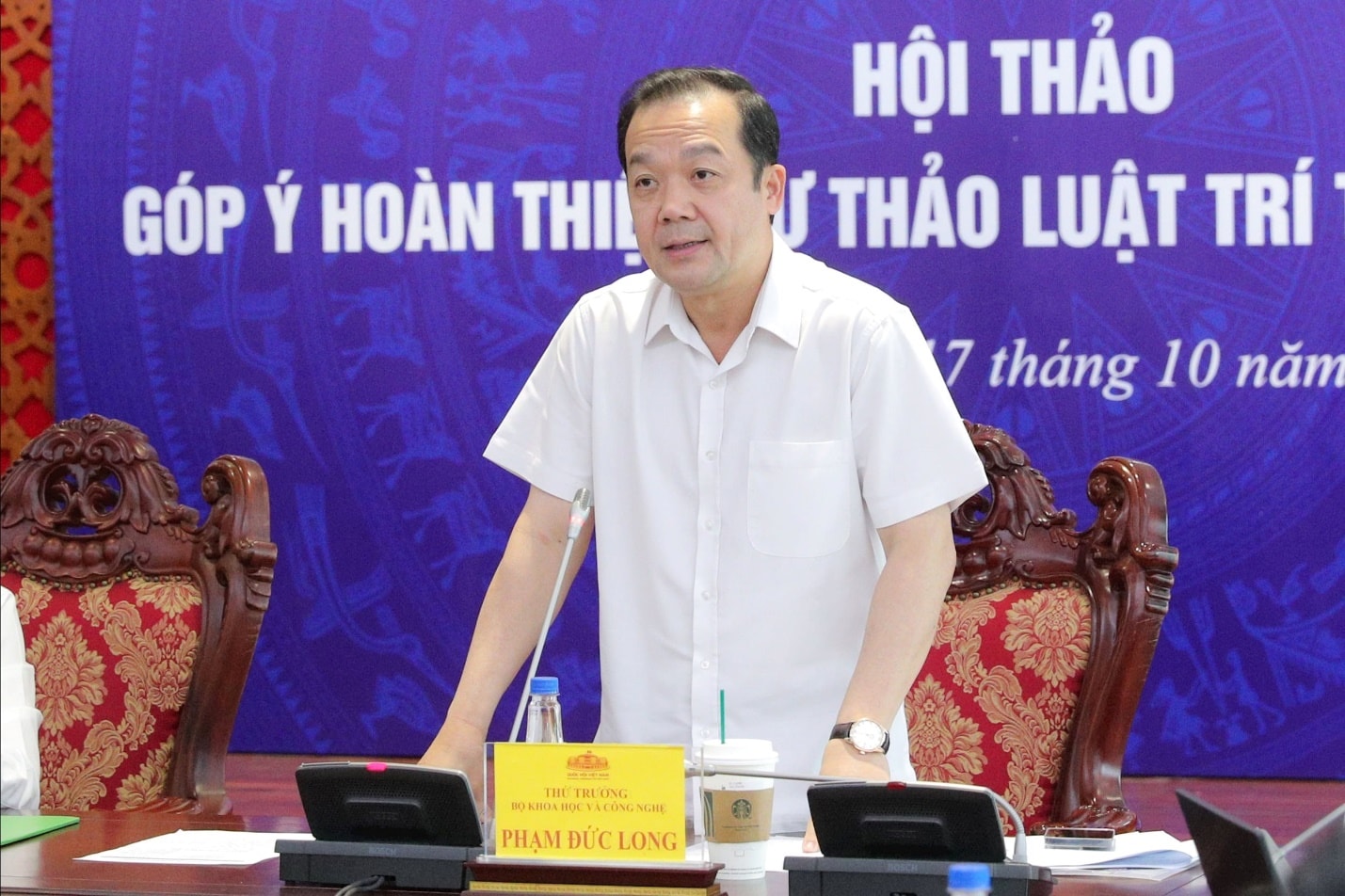Strengthening legal framework, promoting sustainable development of AI
The development of the Law on Artificial Intelligence (AI) plays an important role in socio-economic development and in today's life. It is very important to promulgate a clear legal corridor with specific policy groups to maximize the positive aspects of AI as well as clearly identify the risks of AI.
On the morning of October 17, at the Headquarters of the National Assembly's agencies, the Committee on Science, Technology and Environment in collaboration with the Ministry of Science and Technology and the Vietnam Union of Science and Technology Associations (VUSTA) held a workshop on comments on completing the draft AI Law.

Effective management and promotion of artificial intelligence
Speaking at the opening of the workshop, Vice Chairman of the Committee on Science, Technology and Environment, Mr. Tran Van Khai said that AI is identified as one of the national priority technologies, playing a key role in digital transformation, developing the knowledge economy and improving national competitiveness.
The timely development of the draft AI Law to be submitted to the National Assembly for consideration and promulgation is very important. This is Vietnam's first law in this field, contributing to create a legal foundation to promote AI research and development, application and governance in a safe, responsible and humane way. It is important for this Law project to identify the right balance between management and promotion.

Vice Chairman of the Committee on Science, Technology and Environment, Mr. Tran Van Khai suggested key issues and policy groups for delegates to discuss and contribute opinions such as: scope of regulation, objects of application of the draft Law; principles of AI development and application; interpretation of terms; the State's policies on AI; prohibited acts; classify and manage AI systems according to risk levels and ensure safety and security; a controlled testing mechanism (sandbox) to create space for innovation and development of new technologies, infrastructure development, human resources to strengthen public-private cooperation in the field of AI; generative AI management, especially responsibility for AI-generated content; responsibilities of stakeholders throughout the life cycle of the AI system; principles for handling violations, delimitation of compensation liability; ensuring consistency and synchronization in the legal system...
Vice Chairman of the Committee on Science, Technology and Environment asked the delegates to frankly exchange discussions with a constructive spirit and go straight to the point; focus on proposing amendments and supplements to regulations and policies in the draft of AI Law.
Commenting at the workshop, Chairman of the Vietnam Union of Science and Technology Associations (VUSTA) Phan Xuan Dung said that the National Assembly and the Government proactively developing the AI Law is a very important and practical step to create a complete legal corridor, manage and use AI effectively. The AI law developed this time is a strategic and flexible mechanism so that AI really becomes a driving force to help Vietnam strongly develop in the coming time.

Create a clear legal corridor to maximize the positive aspects of artificial intelligence
Regarding the national strategy on AI, the draft emphasizes Vietnam's large language model and generative AI, which is intensively trained with Vietnamese language data. Prof. Dr. Ho Tu Bao - Institute for Advanced Studies in Mathematics said that this regulation in the draft is still incomplete.
In-depth analysis of this issue, Prof. Dr. Ho Tu Bao analyzed that AI has 2 main branches: analytical AI and generative AI. In particular, analytical AI (also known as predictive AI) focuses on understanding existing and past data to extract information, search for patterns, explain causes and predict the future, which is analytical, interpretive and predictive in nature. Generative AI focuses on creating new content, ideas, designs or solutions that are not available in training data, mainly creating, designing and synthesizing. Therefore, the national strategy on AI needs to develop and use analytical AI and generative AI in harmony.
Prof. Dr. Ho Tu Bao suggested that the drafting agency needs to review some definitions of AI, AI technology, AI systems, as well as the terms analytical AI and generative AI.
In addition, Prof. Assoc. Prof. Ho Tu Bao also proposed to add the term: AI ethics is a set of principles and standards that all members of society must comply with when researching, developing, deploying and using AI to ensure fairness, transparency, safety and social responsibility.
In addition, the draft Law stipulates the protection of intellectual property rights for AI-related inventions, technologies, works and data in compliance with the law on intellectual property and relevant laws. Some delegates said that the listing of objects protected by intellectual property rights can lead to omissions and lack of generality. Therefore, it is necessary to study and adjust this regulation.
On behalf of the drafting agency, Deputy Minister of Science and Technology Pham Duc Long affirmed that the development of the AI Law is extremely important for socio-economic development and in today's life. It is very important to promulgate a clear legal corridor with specific policy groups to maximize the positive aspects of AI as well as clearly identify the risks of AI.

On the basis of the comments of delegates, experts, and guests, the Ministry of Science and Technology will consider as many opinions and proposals as possible to complete the draft AI Law.
Speaking at the conclusion of the workshop, Vice Chairman of the Committee on Science, Technology and Environment, Mr. Tran Van Khai said that the Standing Committee recognized and appreciated the diverse opinions, with scientific content and practical value. In which, it focuses on issues such as: Scope of regulation and objects of application in the draft Law; Principles of AI development and application; State policies on AI; Prohibited acts; Classify and manage AI systems according to risk levels, ensuring safety, security and ethical compliance; Developing infrastructure, human resources and strengthening public-private cooperation in the field of AI; Principles of handling violations and delimitation of responsibilities, compensation, dispute settlement, etc.
On the basis of the opinions at the workshop and the written comments, the Standing Committee will synthesize and analyze for verification; closely coordinate with the Ministry of Science and Technology - the agency in charge of drafting to study, consider and complete the draft Law and submit it to the National Assembly for consideration and comments./.
Translated by Vietnam Journal of Science and Technology (VJST - MOST).

